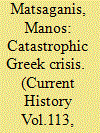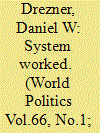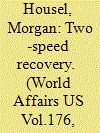|
|
|
Sort Order |
|
|
|
Items / Page
|
|
|
|
|
|
|
| Srl | Item |
| 1 |
ID:
129209


|
|
|
|
|
| Publication |
2014.
|
| Summary/Abstract |
Greece holds the rotating presidency of the European Union for the first half of 2014. As some commentators in Germany and elsewhere have been quick to note, there is surely something incongruous, if not outright absurd, in the spectacle of the most wayward member of Europe's family of nations setting the agenda (or pretending to), even for such a short time. For Greece is still in the throes of a terrible crisis. The experience of economic failure, nearbankruptcy, deep and protracted recession, a sudden fall in living standards, and bitter political conflict has dangerously raised the temperature of public debate. As if to prove the critics right, the Greek presidency got off to an inauspicious start, marked by a series of events ranging from the grotesque to the tragic. Former Transport Minister Michalis Liapis was caught driving without a licence and with counterfeit registration plates by traffic police too young to recognize him. It then transpired that his family home had been refurbished courtesy of Europe's taxpayers: EU "structural funds" earmarked for upgrading tourism infrastructure were diverted for his private use. Since the faction Liapis belonged to in the ruling conservative party was no longer influential, the prime minister's office declined to lift a finger to stop the wheels of justice, opting instead for a show of respect for judicial independence and the rule of law
|
|
|
|
|
|
|
|
|
|
|
|
|
|
|
|
| 2 |
ID:
128268


|
|
|
|
|
| Publication |
2014.
|
| Summary/Abstract |
Prior to 2008, numerous international relations scholars had predicted a looming crisis in global economic governance. Policy analysts have only reinforced this perception since the financial crisis, declaring that we live in a "G-Zero" world. This article takes a closer look at the global response to the financial crisis and reveals a more optimistic picture. Despite initial shocks that were more severe than the 1929 financial crisis, global economic governance structures responded quickly and robustly. Whether one measures results by outcomes, outputs, or process, formal and informal governance structures displayed surprising resiliency. Multilateral economic institutions performed well in crisis situations to reinforce open economic policies, especially in contrast to the 1930s. While there are areas where governance has either faltered or failed, on the whole, the system has worked. Misperceptions about global economic governance persist because the Great Recession has disproportionately affected the core economies; analysts have conflated national with global governance; and the efficacy of past periods of global economic governance has been badly overestimated. Why the system has worked better than expected remains an open question, but we can tentatively conclude that both the power of the United States and the resilience of neoliberal economic ideas were underestimated.
|
|
|
|
|
|
|
|
|
|
|
|
|
|
|
|
| 3 |
ID:
128393


|
|
|
|
|
| Publication |
2014.
|
| Summary/Abstract |
The August 2013 gross domestic product report by the US Bureau of Economic Analysis drew little attention, but it contained a fairly remarkable piece of data: Inflation-adjusted GDP per capita in the United States hit a new all-time high in the second quarter of 2013, the first time a new high had been reached since 2007. Real consumer spending has hit a new high, too, and auto sales are at levels not seen since before the financial crisis. Millions of Americans are still searching for work and suffering financial hardship, but on average, by the broadest measures of economic performance, America's Great Recession is over. Few nations across the Atlantic can say the same. The eurozone slipped back into recession in 2012 for the second time in four years, and remains in an economic state that can be accurately described as miserable. Real economic output among eurozone nations remains three percentage points below its 2008 peak. Eurozone unemployment sits near twelve percent in late 2013, higher than the US ever experienced at the peak of its recession. These problems are as deeply human as they are economic or political. Each percentage point rise in Europe's unemployment rate has boosted its suicide rate by 0.79 percent, according to a study published in the medical journal the Lancet.
|
|
|
|
|
|
|
|
|
|
|
|
|
|
|
|
|
|
|
|
|